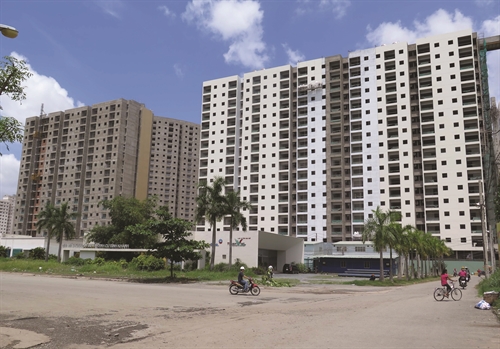Vu Thi Hong Yen[1] and Bui Duc Giang[2]
KEY POINTS:
- Under the new Law on Real Estate Business, the project owner has an obligation to seek a bank guarantee to secure the refund of all amounts that the purchaser or hire purchaser of a future residential house has paid to it in case of its failure to hand over the residential house to the latter.
- There are some (substantial) contradictions between the provisions of this law and the newly released guidelines of the State Bank of Vietnam.
- It would be difficult for banks to take efficient security to secure the owner’s obligation to refund.
From the provisions of the Law on Real Estate Business…
Under Article 56 of Law on Real Estate Business No. 66/2014/QH13 dated November 25, 2014 (the Law on Real Estate Business), before selling or granting hire-purchase of a future residential house, the project owner (the owner) is obliged to sign a guarantee contract with a commercial bank to secure the refund to the customer of an advance of a percentage of the contract price and all other amounts in accordance with the terms of the contract for purchase and sale or hire-purchase of the future residential house which has been signed in case of the owner’s failure to hand over the residential house to the customer according to an undertaken schedule. The owner must provide a copy of the guarantee contract to the purchaser or hire purchaser upon entering into the contract for purchase or hire-purchase.
As such, in this guarantee relationship[3]:
- the guarantor is the bank, the principal debtor is the owner and the beneficiary of the guarantee is the purchaser or hire purchaser (the customer);
- the guaranteed obligation is the obligation to refund the advance of a percentage of the contract price and all other amounts already paid by the customer to the owner up to the time where the guarantee is called[4] in accordance with the contract for purchase and sale or hire-purchase of the future residential house: in case the owner fails to hand over the residential house to the customer in accordance with the agreed-on schedule, the customer may call the guarantee to recover those amounts;
- only when the owner has found a customer for a specified future residential house, must it approach a bank to seek a bank guarantee.
The requirement of a bank guarantee in case of sale or hire-purchase of future residential houses is believed to help not only protect customers against the risk of losing their advances when dealing with owners acting in bad faith or becoming insolvent but also promote the real estate market in Vietnam. However, it risks leaving owners exposed to sudden and unpredictable interruptions of their cash flow. This is not a good thing especially in the current context where it is often not easy to take out bank loans to finance real estate projects. Furthermore, owners may increase their prices excessively to cover the contingency[5].
 |
| High-rise apartment buildings in District 2, Ho Chi Minh City __Photo: Hoang Hai/VNA |
... to the State Bank’s guidelines
On June 25, 2015, the State Bank of Vietnam enacted Circular No. 07/2015/TT-NHNN on bank guarantees which came into effect on July 1, 2015 (Circular 07). This circular contains various changes to the old regime of bank guarantees under Circular No. 28/2012/TT-NHNN dated October 3, 2012, as amended in 2014. Its Article 12 specifically deals with bank guarantees[6] provided in the sale and hire-purchase of future residential houses. This text has been long overdue.
Article 12.1(d) of Circular 07 provides that:
“the [eligible] commercial bank shall be permitted by the State Bank of Vietnam to issue bank guarantees in its license for establishment and operation or in any document amending its license for establishment and operation”;
It is obvious that all commercial banks licensed by the State Bank of Vietnam to provide bank guarantees may issue that type of guarantee. This means that there is no close list of commercial banks[7] capable of providing guarantees in trading of future residential houses as some have speculated when literally interpreting Article 56.1 of the Law on Real Estate Business.
Sadly, it is unclear under Circular 07 whether foreign bank branches may provide owners with guarantees or not[8].
Furthermore, under Circular 07, the bank will issue the guarantee only if the contract for purchase and sale or hire-purchase of a future residential house provides for the owner’s obligation to refund the advance the customer in case the owner breaches its obligation to hand over the residential house to the customer according to the agreed-on schedule[9]. It is easy to note a contradiction between this provision and Article 56 of the Law on Real Estate Business. Indeed, the spirit of the Law on Real Estate Business is that the guarantee contract must be signed before the contract for purchase and sale or hire-purchase of the future residential house whilst this process is reversed under Circular 07. The rationale behind the State Bank of Vietnam’s guidelines might be that if the parties merely provide the bank with the draft contract for purchase and sale or hire purchase of the future residential house and the bank then issues a bond on the basis of this draft contract, the bank will be exposed to the risk that the scope of the guaranteed obligation (which constitutes the basis for the calculation of the guarantee fees, and more importantly the bank’s liability) may change at the time the parties actually enter into the contract for purchase and sale or hire-purchase of the future residential house. With regard to drafting techniques, it is not possible to refer to the contract for purchase and sale or hire-purchase of the future residential house which gives rise to the guaranteed obligation when this contract has not been executed yet.
In practice, some Vietnamese courts do not recognize a general identification of the secured obligation although Article 8a of Decree No.163/2006/ND-CP dated December 19, 2006, on secured transactions, as amended in 2012, expressly validates this practice.
Therefore, the State Bank of Vietnam’s approach appears to be more appropriate. The difference is not a matter of mere legal pedantry.
The customer may protect himself in insisting on the contract for purchase and sale or hire-purchase of the future residential house including a clause that this contract will take effect only from receipt of the bank guarantee.
It should be borne in mind that under Article 3.12 (b) of Circular 07, a guarantee contract is an agreement between the guarantor (the bank) and the beneficiary of the guarantee (the customer) and other parties concerned (e.g., the owner). Consequently, the concept of guarantee contract mentioned in the Law on Real Estate Business should be construed in a flexible manner as the guarantee undertaking being either a letter of guarantee issued by the bank or the guarantee contract seen in light of Circular 07.
Finally, Article 56.2 of the Law on Real Estate Business provides that the guarantee shall be valid until the handover of the residential house to the customer. This rule is quite rigid because:
- in some cases, the owner will not be able to hand over the residential house; and,
- it is contrary to the basic principles on rescission and termination of guarantees as set forth in Articles 370[10] and 371[11] of the Civil Code.
By contrast, pursuant to Article 12.1(f) of Circular 07, the guarantee must be effective until a date at least 30 days after the scheduled date of handover of the residential house to the purchaser or hire purchaser. Furthermore, Article 23 of Circular 07 enumerates at least 7 cases of termination of the guarantor’s obligation (by mutual agreement, in case of rescission of the underlying contract…)[12]. Circular 07’s approach seems much more appropriate than that of the Law on Real Estate Business.
What security to take?
Guarantees are considered by law[13] as a type of credit granted by the bank to the owner[14] and the bank may decide in its absolute discretion to take security for this credit or not (Article 17 of Circular 07). However, as this type of credit presents high risks, in addition to collecting guarantee fees[15], the bank should take efficient security.
Banks may take security over future residential houses built by the owner in the project in question. Article 147.1 of Law No. 65/2014/QH13 on Residential Housing dated November 25, 2014 (the Law on Residential Housing) allows the owner to mortgage (i) all or part of the project, or (ii) residential houses developed in the project, in order to mobilize funds necessary for the implementation of the project[16]. Interpreting this text in a broad manner, it can be inferred that the owner may mortgage the project or residential houses developed in the project to secure the owner’s obligation to repay the bank once the latter has paid the customer in accordance with the guarantee.
It should be noted that if the owner had mortgaged the residential house or the project in question to take bank loans, in principle, it must end that mortgage before entering into a contract for capital mobilization or for purchase and sale or hire-purchase (Article 147.1 of the Law on Housing).
As such, if the issuer of the guarantee has already granted a loan to the owner to finance the implementation of the project, the total volume of secured assets will be reduced accordingly upon the signing of those contracts. The issuer should then consider whether:
- it is possible to take security over other items of residential housing which remain “unencumbranced” or not;
- the real value of all land use rights and residential houses mortgaged in its favor will allow or not for the repayment of the initial loan and the guaranteed amount;
- the owner has other assets capable of being used as security or not; and
- it is possible to take other security interests (escrow deposit, parent company guarantees...)[17].
If the issuer is not the initial lender which has taken security over the residential houses or the project, it will rank behind this latter on enforcement of security and thus the risks facing that issuer would be much greater.
The nature of the bondsmen’s engagement
Vietnamese law guarantees are particularly favorable to creditors and thus “dangerous” for bondsmen. Indeed, under Article 4.18 of the Law on Credit Institutions and Articles 3.1 and 21 of Circular 07, if the owner fails to hand over the residential house to the customer on the agreed-on date, the customer may recover his advance from the bank without having to prove the owner’s inability to pay. This also implies that the customer is entitled to bring proceedings against the guarantor without enforcing his rights against the principal debtor. Vietnamese law guarantees have much of the characteristics of English law ones - being that English law is often chosen or imposed by offshore credits when guarantees or bonds are provided by onshore banks - while Vietnamese law is lacking efficient guarantor protections which are available under English law.
It is noteworthy that on-demand bonds (i.e. where the obligation to pay arises on first demand without any independent evidence of the validity of the claim)[18] are not expressly provided by Vietnamese law.
In practice, in some cases, the fact that owners fail to hand over residential houses to their customers may mean that they are on the verge of insolvency and in such situations, banks will have difficulties in recovering from those owners the amounts that they paid to their customers.
Therefore, Article 12.1(c) of Circular 07 requires banks to carefully assess whether the owners are able:
- to meet the project implementation’s schedule; and
- to use advanced payments and other sums paid by purchasers or hire purchasers to them for proper purposes.
In light of the above, one can notice that guarantees for future residential houses are not really attractive for banks, notably when it is not easy for them to take efficient security. Furthermore, the recent years show that a huge number of real estate loans may become non-performing loans. This is why banks are now not very eager to follow through... -
A guarantee shall terminate in the following cases:
1. The obligation secured by the guarantee terminates.
2. The guarantee is rescinded or is substituted by another security.
3. The guarantor has performed the guaranteed obligation.
4. As agreed upon by the parties”.
The guarantor’s obligation terminates in the following circumstances:
1. The obligation of the principal terminates.
2. The guarantor’s obligation has been performed pursuant to the guarantee undertaking.
3. The guarantee is rescinded or replaced by other security interests.
4. The effectiveness of the guarantee undertaking expires.
5. The beneficiary exempts the guarantor from performance.
6. Pursuant to an agreement between the parties.
7. Pursuant to Clauses 1 and 2 of Article 22.
8. The guarantor’s obligation terminates in other circumstances as stipulated by law”.









